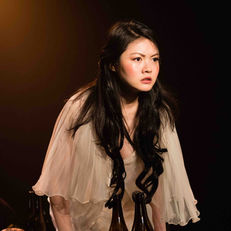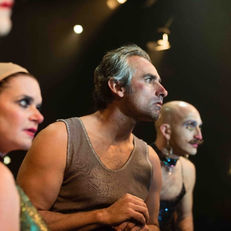SIREN THEATRE CO
THE HAM FUNERAL
THE HAM FUNERAL
By Patrick White
SIREN THEATRE CO IN ASSOCIATION WITH GRIFFIN INDEPENDENT....
DATES: 17 May – 10 June 2017,SBW STABLES THEATRE
PRODUCER & DIRECTOR: Kate Gaul
PRODUCTION DESIGN: Jasmine Christie
LIGHTING DESIGNER: Hartley T A Kemp
COMPOSER & SOUND DESIGNER: Nate Edmondson
VOCAL COACH: Carmen Lysiak
ASSISTANT DIRECTORS: Phaedra Nicolaidis, Sally Dulson
PUBLICIST: Emma Jones
PRODUCTION PHOTOGRAPHY: Lucy Parakhina
Cast: Andy Dexterity, Eliza Logan, Carmen Lysiak, Johnny Nasser, Jane Phegan, Sebastian Robinson, Jenny Wu
Sydney Theatre Critics Awards - WINNER - Best Independent Production
NOMINATIONS - Best Director, Best Design, Best Lighting Design, Best Sound Design, Best Supporting Actor (WINNER)
What the critics said:
"It is a waking dream in which we find ourselves immersed. Nothing looks real, but we know that everything points to something authentic. We are gripped by its mystery, and the hypnotic ambience so expertly manufactured by its team of daring creatives..." - https://suzygoessee.com/2017/05/19/review-the-ham-funeral-siren-theatre-company/
" Patrick White's first play has long lost its capacity to shock an audience as it once did, but as demonstrated in this skeletal staging directed by Kate Gaul, its subversively exuberant spirit endures." - http://www.smh.com.au/entertainment/stage/review-the-ham-funeral-20170521-gw9jbl.html
“Kate Gaul, one of Sydney’s most insightful, confident and versatile directors …. creates a production that sings with all the music and poeticism of White’s text. Gaul has assembled a cast who are able to tread the fine line between the dark and the light in this black comedy.
This is an entertaining, imaginative, first-rate and crystal-clear production of one of the most idiosyncratic plays ever written by an Australian playwright. It’s no fusty museum piece, but should be seen by everyone with an interest in the handful of plays that make up the Australian theatrical canon.” - https://dailyreview.com.au/ham-funeral-review-griffin-theatre-sydney/60015/
“The Ham Funeral is dense and wildly obtuse and director Kate Gaul has steered a lucid path through it and achieves a bright, light production of what is also a darkly humorous gothic drama … timeless in its observation and understanding of human foibles. This is a glorious production" - http://www.stagenoise.com/review/2017/the-ham-funeral
“Gaul’s direction is vibrant, funny, punchy and brutal, with some serious undercurrents of pathos and loss… a masterful cast … bring dazzling energy to the production.” - http://www.sydneyartsguide.com.au/patrick-whites-ham-funeral-stables/
“This is a fabulous production of this at times grotesque, mythological, symbolic, challenging and grippingly dynamic play”
“ When Kate Gaul directs him, Patrick White is at last accompanied by a successive manifesto of the work becoming absolute. Our poet becomes The Ham Funeral fully realised. This brilliant to the point of complete staging of The Ham Funeral carries the awareness of its own innocence and therefore puts an end to that innocence. Literary desire is always knowledge of its own form, a kind of calculated self-interest inflicted upon innocence. The Ham Funeral, the thinking Australian literature, embodies this. Through Kate Gaul’s direction, the writing is free to assert that it’s thinking is also the thought of a thought, turning the thinking into a closed area.
In the fear of the other lay the seeds of unease about ourselves. The Ham Funeral forces us to accept a contemporary absence of our white Australian world. Yet, as Alain Badiou would say” … it holds within that absence of a world an outline of our world, its drawing, its watermark, a sketch on the walls of an underwater cathedral, a network of event traces that are to be traversed and assembled.” It is in theatre that The Ham Funeral strums its corresponding vibration in our soul, and in Kate Gaul’s direction that Patrick White finds a true vehicle for his voice.” - https://lisathatcher.com/2017/06/05/the-ham-funeral-theatre-as-the-ruin-of-discursivity-theatre-review/

Photographer: Clare Hawley
Notes on The Ham Funeral:
The subject of the play is not so much a funeral as a birth, the birth of a poet. We follow the Young Man’s journey through crises of intimidation and self-doubt, from the “great, damp, crumbling house” in which he hides, out into a world of compassion and responsibility, and its tone ranges widely from disgust and pity, comedy and pathos, to brutality and tenderness. It’s also an autobiographical allegory of Patrick White’s struggle to break free from the ties that bound him to his mother, the country of his birth, his friends and lovers, possessions and obligations, indeed any nets beyond which he, as an artist, was hoping to fly.
The play struggled to be produced. In 1961the Adelaide festival Governors reported:
“It is an abstract type of play which the general public will find difficult, and impossible to understand. Its complexity will limit its appeal to a few high intellectuals and even they would find it difficult to interpret the so-called psychological aspects of the play.” It’s no wonder the Festival governors struggled to pigeonhole the play: it doesn’t have a linear story-line, it doesn’t develop with a narrative logic, most of the characters do not have sustained psychological depth, and it doesn’t have a consistent style.
Neil Armfield described the world of White’s theatre as a kind of “vaudeville puppet stage... a magical circus”. The Young Man in The Ham Funeral is not only our protagonist, but also a kind of stage manager/chorus/puppeteer, even referring to the libidinous Alma Lusty as, “That poor Judy they’re bashing in the basement”.
White had what he called a “weakness for the music hall” and that 'weakness' is amply celebrated in the anti- naturalistic tragical farce that is The Ham Funeral. The theatre, he realized, could combine symbolist intentions with psychological depth and great visual imagination, offering him tremendous scope. This liberated him from the technical and linguistic weights of naturalism. This still feels new and innovative today and young artists, theatre makers and audiences of all ages are challenged and inspired by White’s daring in its search for a vernacular lyricism reaching beyond the prescriptively confining four walls of Australian social realism. This production will remind us of the lexicon of theatrical possibility.
Patrick White’s play is rarely produced in Australia – large, unwieldy, stylistically challenging – one of the most intriguingly original plays in Australian theatre history. Geoffrey Dutton - summing up the immediate impact of the play's production, "Perhaps there was among the audience the thought that a reactionary Establishment was being beaten on its own ground, that the evening was going to be a triumph of the imagination over mediocrity. So it was."
White’s play shows a writer constantly exploring and pushing at the limits of his form. He is highly aware of the several languages of theatre, of how visuals and performance reinforce and complicate the meanings of speech, of the metaphor of the stage. He has a novelist’s gift for character, and, crucially, a poet’s ear for the sensuous properties of language.
The meta-theatricality and excess of his dramaturgy in the past caused puzzlement or hostility, and there is criticism around the “literariness”, as if lyrical writing is somehow mutually exclusive to theatre. And yet it’s those very qualities that make this work exciting now to a generation of theatre makers who have never encountered the play and to seasoned audiences now hungry for innovation.
Producing a play for the stage – which is among the most relentless of critical inquiries - deepens and extends our understanding of subversive theatrical form and tests our compositional skills as we create a theatre of philosophical tragi-comedy, grounded in physical expression. It is true that working on the most difficult material advances ones abilities and understanding of craft. Patrick White’s plays are an unwritten bench mark against which Australian theatre artists want to try their luck.
Our production of The Ham Funeral may have been written in London in 1947, anticipating the later plays of Ionesco and Beckett, but its idiom, its humour and its audacity are deeply and indefinably Australian. Positioned as it is amongst the Griffin Theatre’s annual program of new plays, the revival of The Ham Funeral acts as counterpoint, mirror, avante garde to emerging writers and theatre makers.
Perhaps White, it is said, was a parochial playwright with an international sensibility. Parochial in the best sense, as Chekhov was parochial, his work located in and responding to parochial conditions, and bringing to them a wit and insight that was anything but petty. But his plays emerged in a culture that was parochial in the worst sense, as was very clear when The Ham Funeral was rejected by the 1962 Adelaide Festival of the Arts.
This is Siren Theatre’s fourth collaboration with Griffin Independent: a relationship committed to excellence, innovation and daring.


















